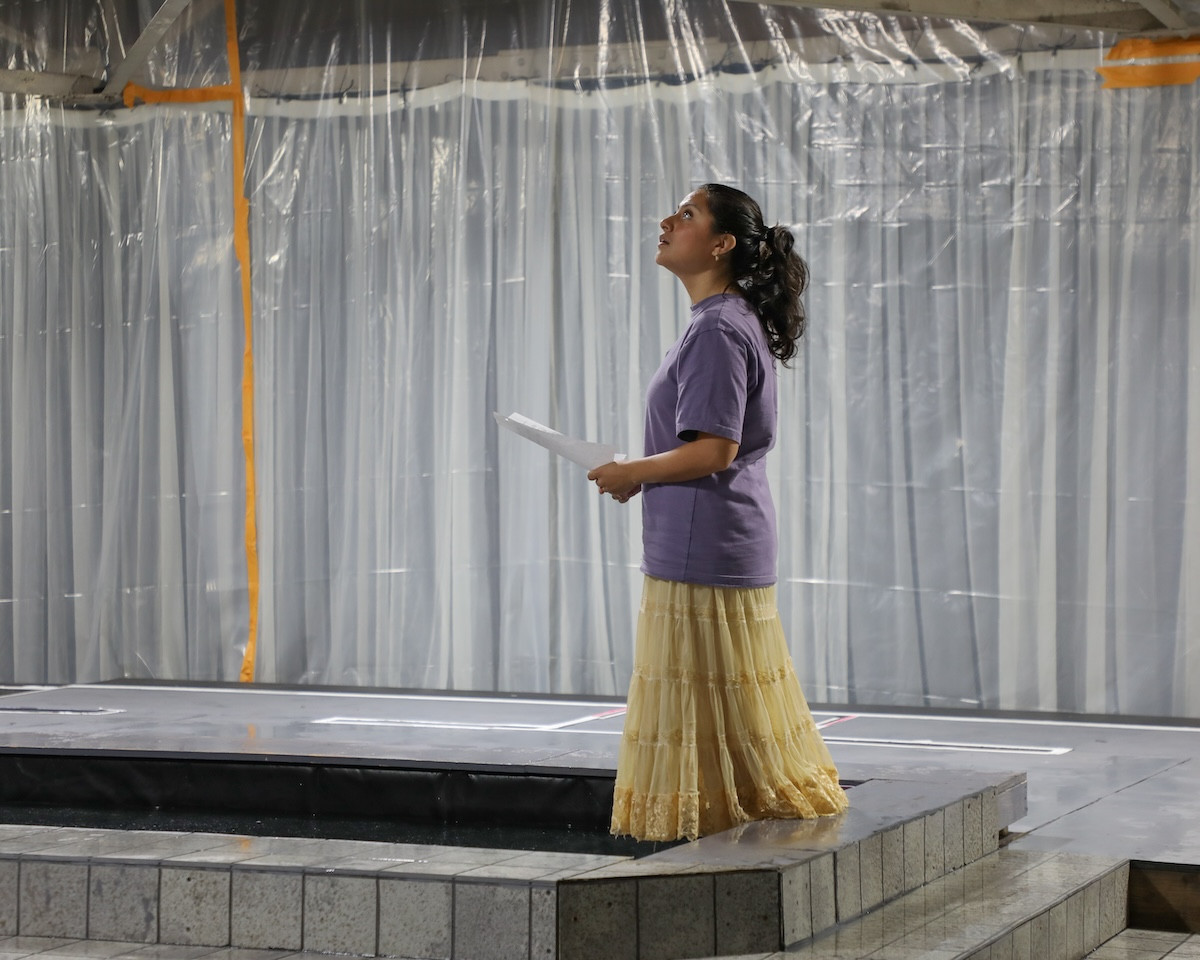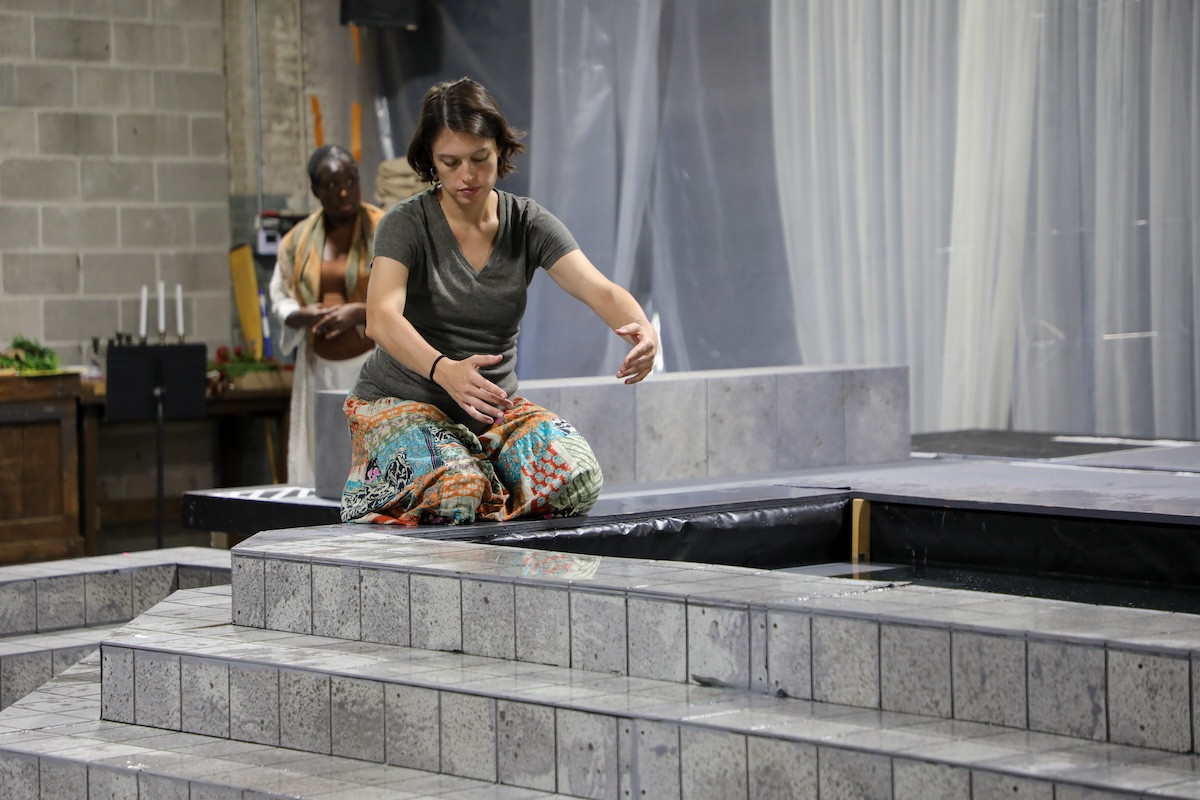Berkshire Theater Group Replaces Stage with Mythical Pool for “Metamorphoses”
News that the director and a star of the play are pregnant further deepens the show's contextual resonance.

News that the director and a star of the play are pregnant further deepens the show's contextual resonance.

actors Kelli Simpkins (in white) and Evelyn Chen rehearse this week in a secondary space while the main Unicorn Thearer Stage is dismantled for pool instilation.
- Berkshire Theater GroupAt Berkshire Theatre Group’s Unicorn Theatre in Stockbridge, the front of the stage has been torn away. In its place, carpenters and technicians are installing a pool. Five feet by ten feet and nearly three feet deep, it will soon hold the bodies of gods, mortals, and myths, when BTG opens “Metamorphoses” on September 25, bringing Ovid’s ancient Greek tales to life in a contemporary water birth. The play runs through October 26.
The play, adapted from the classic Ovid poem “Metamorphoses,” has always been defined by its splashy set. Writer Mary Zimmerman first staged Metamorphoses at Northwestern University in 1996 before making her way to Broadway where she won a Tony Award for Best Direction in 2002. The shimmering pool continues to captivate audiences as a stage where stories of love, loss, ambition, and hubris surface and submerge.

For scenic designer Jason Simms, there was no avoiding the challenge. “At the very beginning, we knew we needed water,” he says. That decision meant tearing out part of the Unicorn stage closest to the audience to expose the concrete foundation. “The result is about a five-foot-by-10-foot pool of water that’s 30 inches deep,” he explains, adding that the pool is lit from within so “the water will glow.”
Simms and director Isadora Wolfe agreed early on that the set needed to feel elemental. He describes it as “ritualistic and magical,” a space that looks as though the performers “just stumbled upon it in order to tell the story,” he says. “Basically, it looks like a Roman bath,” with aged brick creating the feel of a ruin.
Technical director Seth Cavenaugh is the man tasked with the practical side of making that vision work in the Unicorn’s beautiful but tight quarters. “The Unicorn is not a great big space by any means. The whole front of our stage is just stud walls, and that water is a lot of weight,” he says. “Mainly I’m trying to conceptualize what Jason wanted and make it real in this space.”

Cast member Fedra Ramírez Olivares in the rehearsel space.
Cavenaugh is quick to point out that the job doesn’t end with construction. “At certain points, all of our actors are in this pool at the same time,” he says. “You have to account for that displacement and health and safety. It is a very demanding cleaning process every day.”
Equity rules also dictate that the water be kept warm. “It’s been a blast learning all them rules,” he says with a laugh. Still, he says the effort is worth it once “the audience is smiling.”
Wolfe, a choreographer and movement-based director, sees the pool as more than a novelty. “The set is a framework for every single piece,” she says. “The pool is not a gimmick. It’s an element that this world of characters lives in. They appear and disappear from it.”

Stephanie Jean Lane in rehersal.
Water, for Wolfe, is a metaphor as well as a medium. It speaks to beginnings and endings, and to humanity’s fraught relationship with nature and time. “It’s about the essence of human nature—greed, love, ambition,” she says, noting how Zimmerman’s adaptation shows gods not as infallible icons but as flawed beings whose choices reverberate across mortal lives.
Her perspective is also personal. “Surprisingly, I’m pregnant, and so is one of the cast members,” Wolfe shares. That reality, she explains, has changed the atmosphere already in the rehearsal pool. “There’s so much movement in it. It’s in water. Those are all such feminine elements. Having that female creation energy in the room changes the way we protect certain characters or highlight certain vulnerabilities.” The other cast member she references is accomplished actor Stephanie Jean Lane. For Wolfe, their pregnancies underscore the themes of care, vulnerability, and renewal that run through Ovid’s myths.

Director Isadora Wolfe.
Zimmerman’s script condenses hundreds of stories from Ovid into a handful that resonate with contemporary audiences. They are timeless, Wolfe argues, because they address recognizable impulses. “The gods are not infallible,” she says. “They’re flawed amplifications of human impulses.” The result is a production staged “on the precipice of before-times and after-times,” where body, text, and architecture combine in a ritualistic space.

The Unicorn Theater.
The Unicorn’s staging follows in the lineage of earlier productions that famously seated audiences close enough to feel a bit of the splash. Here, Wolfe directs a company that includes Gregg Edelman (as Midas and others), David Adkins, June Carryl, Evelyn Chen, Paul Deo Jr., Lane, Tim Liu, Fedra Ramírez Olivares, Kelli Simpkins, and John Williams Watkins.
Together, they will navigate a set that is as much a character as it is a stage, diving into Ovid's world of transformation and consequence.